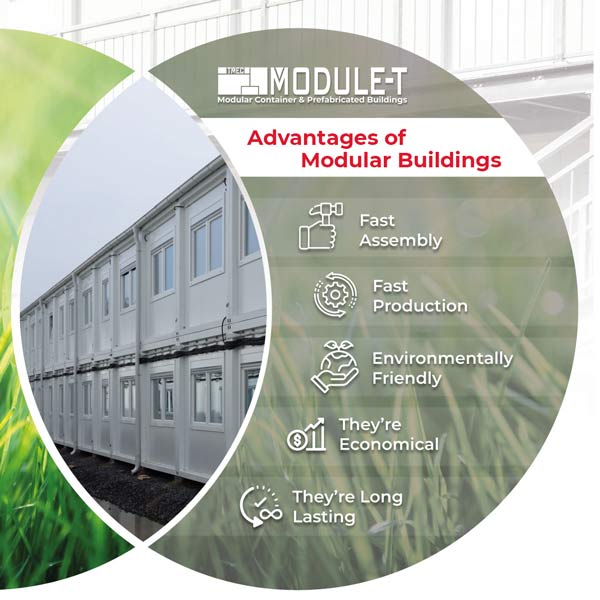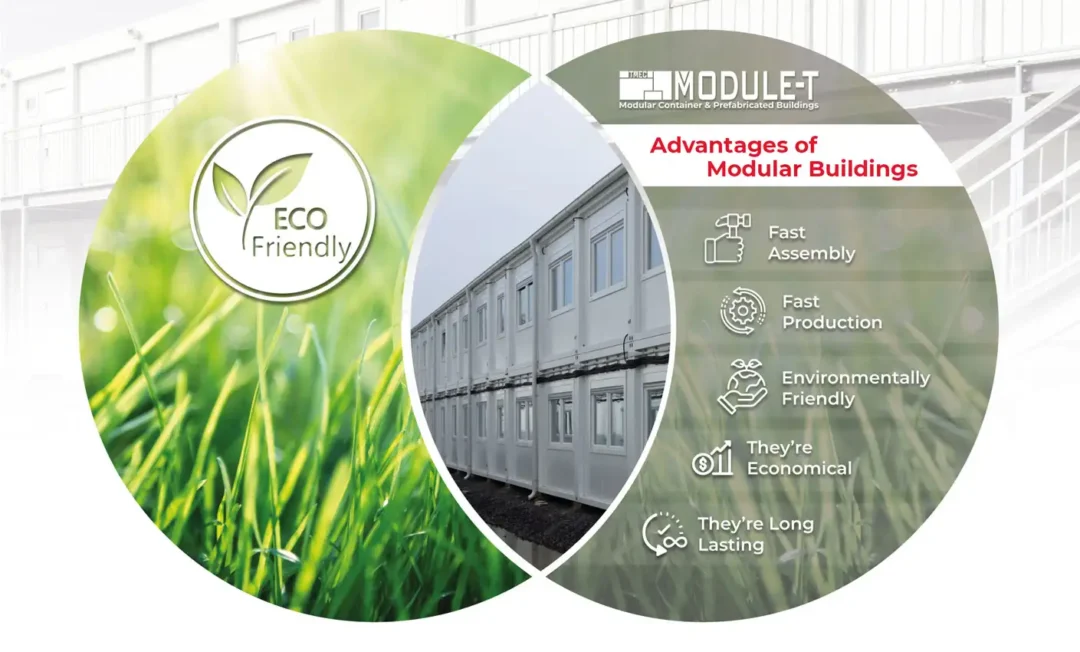Benefits of Modular Constructions
6 March 2023The Potential Sustainability Benefits of Modular Constructions
Recent years have witnessed a shift towards sustainable modular construction. There are many reasons for this, but financial and cost savings aside, one of the key driving factors is that prefabricated modular buildings and the process by which they are made have proved far more environmentally friendly than conventional construction. Here’s a look at the benefits of modular constructions and the answers to some of the most frequently asked questions about sustainability and prefabricated buildings.
10 Benefits of Modular Construction
1- Construction Speed and Time Efficiency: Modular construction significantly reduces construction time compared to traditional methods. Modules are constructed off-site concurrently with on-site preparation, allowing projects to be completed in a shorter timeframe.
2- Cost-Effectiveness: Time savings translate into cost savings. Reduced labor costs, minimized material waste, and efficient resource utilization contribute to lower overall project costs.
3- Quality Control: Modules are built in a controlled factory environment, where quality can be closely monitored. This results in higher-quality structures with fewer defects and inconsistencies.
4- Flexibility and Customization: Modular construction allows for flexibility in design and customization. Modules can be tailored to meet specific project requirements, and modifications can be easily accommodated.
5- Reduced Site Disruption: Much of the construction work is done off-site, minimizing on-site disruption. This is particularly beneficial in urban areas or sensitive environments where noise, dust, and traffic congestion need to be minimized.
6- Sustainability: Modular construction often generates less waste and consumes fewer resources than traditional methods. Additionally, the controlled manufacturing process allows for more efficient use of materials, reducing environmental impact.
7- Improved Safety: Factory-controlled construction environments prioritize safety measures, resulting in fewer accidents and injuries compared to traditional construction sites.
8- Consistent Quality: Standardized manufacturing processes ensure consistent quality across modules, eliminating variability often associated with on-site construction.
9- Reduced Construction Delays: Factors such as adverse weather conditions have less impact on modular construction projects since much of the work is done indoors. This reduces the risk of project delays.
10- Scalability: Modular construction is highly scalable, making it suitable for projects of various sizes and complexities. Whether it’s a small residential building or a large commercial development, modular construction can be adapted to meet the project’s needs.
Frequently Asked Questions: Sustainability and Modular Construction
Sustainability is a societal goal to meet the basic needs of modern life without harming or negatively affecting the world’s natural resources, climate, and environment. Sustainability aims to strike a positive balance between the world’s economic and social needs and the environment to preserve the world’s natural resources for future generations.
Sustainable construction involves building structures in a way that helps to reduce the negative impact on the climate and the environment. Sustainable builders consciously use materials and operational processes to help to preserve the world’s natural resources.
The construction industry frequently attracts negative press, media, and criticism from environmental agencies and the eco-conscious. Traditional building methods create a great deal of material waste that often ends up in landfills. The heavy machinery used on the building sites is also blamed for creating harmful carbon emissions that pollute air quality and can negatively affect the atmosphere, which could lead to global warming and climate change.
These valid concerns are why many individuals, companies, and industries now explore and opt for more environmentally friendly and energy-efficient building alternatives, such as sustainable modular construction.
What are the sustainability benefits of modular construction?
Aside from the numerous social and economic advantages of modular constructions, prefabricated building methods enjoy the following sustainability and environmental benefits:
- Reduced Waste: Rather than shipping and storing building materials on site, prefabricated buildings are made in a controlled factory remotely where high technology ensures all the elements of the prefab building are precision cut, thereby creating less waste. Any waste products that are produced can usually be recycled.
- Fewer Carbon Emissions: The regulated manufacturing process of modular constructions significantly reduces harmful emission levels. All the prefab building elements are made remotely, eliminating the harmful emissions released from the heavy machinery and vehicles used on traditional building sites. Wastage is also minimal, so less ends up in landfills, significantly reducing long-term carbon emissions and therefore helping to protect air quality and the atmosphere.
- Energy-Efficient: All our prefabricated structures are optimised for long-term energy efficiency. The walls, floors, and ceilings are fully insulated, the windows double-glazed, and many additional energy-saving elements can be added, e.g., solar panels and LED or intelligent lighting, to ensure utility and long-term energy costs are kept in check.
- Less Impact on The Landscape: Most modular constructions require only lightweight foundations, dramatically reducing the impact on the site and landscape. Modular buildings weigh less and are designed to be relocated many times, meaning the land and its flora and fauna can recover quickly if the building is moved elsewhere.
- Responsibly Sourced Materials: Many materials used to make modular constructions are recycled or supplied from sustainable sources. Where possible, Module-T uses sustainable products in our constructions.
- The Buildings Can Be Moved and Repurposed: One significant advantage of modular constructions is that, unlike conventional structures, they can be repurposed and moved elsewhere. For example, if you require an office or emergency accommodation for a temporary site, once you have used the building and it’s time to move on, you can dismantle it, repurpose it, and use it for your next project.
- Cleaner Onsite Operations: Conventional construction sites are busy, dangerous, and often chaotic. The cranes, materials, debris, heavy machinery, and additional onsite labour pose significant risks regarding the health and safety of your existing site staff. In contrast, modular buildings are made remotely, eliminating the noise, disruption, and danger to those at the location.
- Reduced Neighbourhood Disruption: The noise created at traditional construction sites is considerable and often a cause of distress for those in the immediate vicinity. The heavy vehicles frequently travelling to and from the site can also cause damage to the roads and local infrastructure. This risk is eliminated with modular construction. as the entire building is manufactured remotely.
- Solves The Affordable Housing Issue: The lack of safe, comfortable, and affordable housing is an issue many countries and locations face. Buildings made with bricks and mortar are expensive and take months or even years to complete. Sustainable modular structures offer a savvy time and cost-effective alternative that addresses this issue. These highly versatile buildings are quick to produce, easy to assemble and cost far less. They are highly durable, can be customised in numerous ways, and come in many styles and designs, meaning they appeal to the majority. They also adhere to international building codes and current earthquake and cyclone regulations, making them suitable for use in any location.
What sustainable prefabricated buildings do we produce?
Module-T specialises in designing and manufacturing a wide range of standard and custom commercial, residential, and industrial modular buildings. We supply sustainable constructions to more than 120 countries from our facilities in Turkey. Our most popular products include:
- Modular Office Buildings
- Accommodation Blocks and Dormitories
- Modular School Buildings and Classrooms
- WC, Shower, and Sanitary Containers
- Prefabricated Guard Houses and Kiosks
- Canteen, Restaurant and Catering Buildings
- Prefabricated Houses (1 – 4 Bedrooms)
- Modular Locker and Changing Rooms
Module-T, A Leading International Supplier of Sustainable Modular Constructions
Prefabricated buildings have advanced a lot over the last two decades. The use of high technology, quality materials, and innovative design ensures modular buildings combine the latest construction techniques with sustainability and the need to reduce the impact on our ecosystem and the environment. For more information on sustainable modular construction and the advantages of modular buildings, please get in touch with us.
Request a Quote from Modul-T for Sustainable Modular Buildings Now!
CONTACT US
MODULE-T
KURIS KULE D-100 GUNEY YANYOL NO: 2 / 77-78 , KARTAL/ISTANBUL - TURKEY
PREFABRIK DIS TIC VE SAN LTD STI- +90 216 441 01 77
- Send Whatsapp Message
- info@module-t.com




